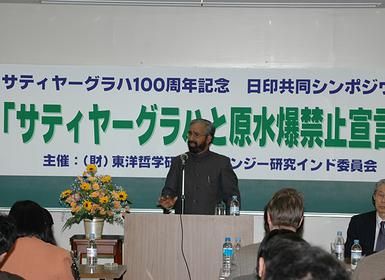

 
|
Indo-Japan
Joint Symposium to commemorate the Centennial of Gandhi’s Satyagraha
 On
April 3, 2007, Indian Committee for Gandhi Studies and the Institute of
Oriental Philosophy (IOP) cosponsored the symposium “Satyagraha
and Declaration on Abolition of Nuclear Weapons” at the IOP. On
April 3, 2007, Indian Committee for Gandhi Studies and the Institute of
Oriental Philosophy (IOP) cosponsored the symposium “Satyagraha
and Declaration on Abolition of Nuclear Weapons” at the IOP.
The
term “Satyagraha,” known as
nonviolent resistance, was coined by Mahatma Gandhi. He deployed
Satyagraha during his earlier struggle in South Africa for Indian
rights. Gandhi was 24 when he arrived in South Africa and employed as a
lawyer. However, he faced the discrimination directed at all colored
people. On September 11, 1906, a mass protest meeting was held in
Johannesburg. Gandhi spoke in front of 3,000 people and adopted his
methodology of Satyagraha, non-violent protest, for the first time.
Gandhi defined Satyagraha as devotion to the truth. This idea was
successful in the Indian independence movement and it influenced the
civil rights movement in the United States.
The symposium“Satyagraha and
Declaration on Abolition of Nuclear Weapons” was held to commemorate
the 100th anniversary of the Satyagraha movement and also the 50th
anniversary of president Toda’s call for the elimination of nuclear
weapons.
At the symposium, N. Radhakrishnan,
Chairman of the Indian Council of Gandhian Studies presented a lecture
and three
representatives from the IOP gave presentations. IOP Research Fellow
Mikio Matsuoka spoke on the connection between Gandhi and Toda. IOP
Director Yoichi Kawada presented a paper on the “Declaration of the
Abolition
of Nuclear Weapons and the Power of Spirit” and IOP Senior Research
Fellow Toshie Kurihara offered a perspective on struggle of women in
India and Japan.
|











